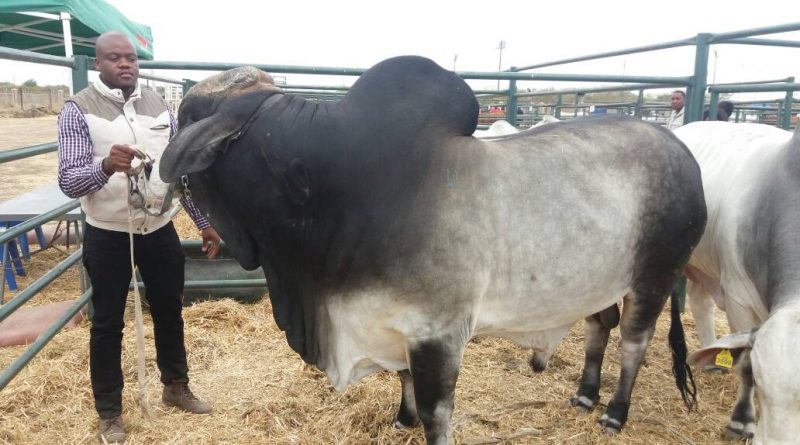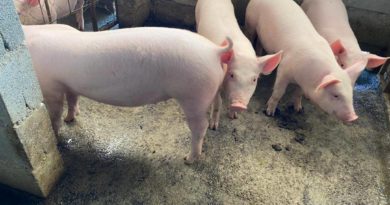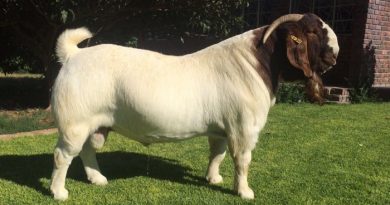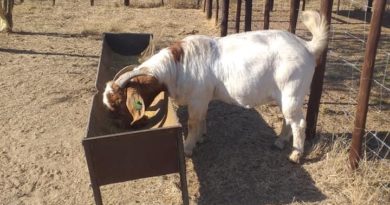Laone Larry Maswikila of the Rocky Creek Brahman
Good management is the key to successful stud breeding. So says stud breeder Laone Larry Maswikila of the Rocky Creek Brahman Stud. Rocky Gofamodimo met and had a chat with him to find out more about his enterprise.
Larona Maswikila, is one of the few young Batswana who ditched the glitzy life of the urban areas to follow their passion into agriculture. A graduate from Leeds University in the United Kingdom, Larry, as he is affectionately called by those close to him, is a Brahman stud breeder of repute.
He farms in a 1200hectare farm in Tuli Block. He started his farming venture four years ago with some financial backing from the Citizen Entrepreneur Development Agency (CEDA).
“I started with a herd of thirty pregnant cows, fifteen heifers and a bull.’ Says Larry. He also imported semen from the United States and South Africa. “Narrating on his choice of semen and line of breeding, Maswikila explains that he is into the HBS and BBS genetics. He also incorporates the Rexcrata lines.
Maswikila’s love for Brahmans dates way back to when he was still a small boy. “I have always loved Brahmans. Our neighbour kept them and I fell in love with them”, he adds.
Explaining his choice of the Brahman, Larry says that apart from his love for the breed, he chose it because at Rocky Creek they believe in breeding animals that are well adapted to the adverse conditions of Botswana where rainfall is unpredictable and droughts are a regular occurrence. He has a single breeding season which is from December to March.
“In stud breeding, you can’t afford animals that don’t perform optimally on the veld. This is why I even love the Brahman more. It is hardy, fertile and can produce top quality weaners in a reasonably short time.” Says Larry. He does not feed his animals save for supplementing with P6 in summer and Vasbyt in winter.
Rocky Brahman is registered with the South African Breeders Association. They do the inspection and all the certifications. As a member of the Brahman society of South Africa, Larry laments the fact that unscrupulous breeders continue to sell untested bulls, with some carrying sexually transmitted diseases that cause infertility and abortions to unsuspecting farmers.
Every Rocky Creek bull is tested for fertility and any diseases before being put up for sale. Certified bulls brought in, if any, are kept in quarantine for at least 21 days before being introduced to the herds.
“Prospective buyers should only buy bulls that are certified free from diseases.” Emphasizes Larry.
Larry further noted that he was very lucky to farm on a 1200hectare fenced and paddocked farm. “It’s not very easy to acquire land in our country” he said. Larry stresses that the secret to a successful stud breeding enterprise is good management practices.
He further adds that starting a stud breeding business is no walk in the park as in most cases, you realise that your vision differs from those around you, especially when dealing with financial service providers. Maswikila says that he prefers to market and sell bulls at three years but because of his obligation to financiers, he ends up selling them before the appropriate time in order to raise funds to service his loan.
“It is very difficult to explain to our financial institutions how it goes with stud breeding. Our bulls should be sold at three years and heifers at at-least twenty four months.” He explains. This is because you have to feed them and get them in optimum condition before selling. He however says that there are times when financiers do listen to their pleas and they are able to come to a compromise subsequently giving them an extension for the loan repayment.
The market is good. We have been able to market through social media and events such as the Tuli Block Auction and the Serowe Show. “The only challenge is selling them at the right age, we end up selling at a lower age because of financial constraints.” Says Larry.
Maswikila says that they sell directly to other breeders and market his animals by attending agricultural shows such as the Serowe Show and the Tuli day farmer’s day and auction. “We also have a property in Mogapi, kinda of a feedlot, where we keep and market our bulls.” Says Maswikila.
Finally
Apart from good management, Larry’s other important advice to those who want to start stud breeding is that they must set goals and objectives before buying anything.
“Be clear in why you want to start stud breeding and what you want to achieve,” he explains.Farmers must be clear and really serious about why they want to establish a stud and also how they’re going to go about it. They must consider the area where the farm will be based, their skills and the total set up costs.
“Farming generally is not a short-term investment. Be clear on whether you want to make a financially viable business or just have it as a hobby.” He says
Once clear goals have been set, Larry says that it is vital to select a breed suitable to local conditions and marketable as well. He emphasizes that while selecting a breed that one is passionate is important, farmers must not forget that, unless it is just a hobby, the farmers must have a market for his animals at the end of the day.
His long-term goal is to contribute to a food secure Botswana with less imports.
“One of the ways to achieve this is to increase production in the beef industry,” he says. Production can be increased through improved genetics, improved bio-security measures, and through proper veld management strategies, he insists.



